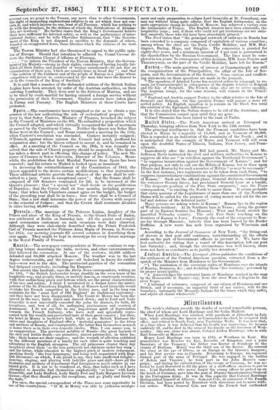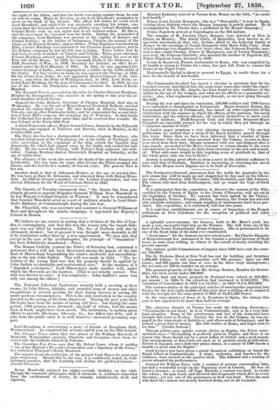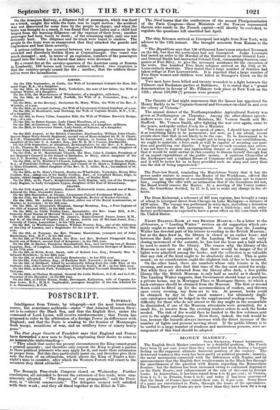33110rtIl1tmus.
The week's obituary records the deaths of several remarkable persons, the chief of whom are Lord Hardinge and Sir Colin Halkett.
When Lord Hardinge was stricken with paralysis at Aldershott in July last, while attending the Queen as Commander-in-chief, he resigned that office, and retired to South Park, near Tunbridge Wells. It was here that, at a time when it was believed that his health was improving, lie became suddenly ill, and he died in the arms of his family on the forenoon of Wed- nesday. One son alone was absent, Colonel Arthur Hardinge, who is with Earl Granville at Moscow.
Henry Lord Hardinge was born in 1785, at Wrotham in Kent. His grandfather was Member for Eye, Recorder of Kingston, and a joint Secretary of the Treasury ; his father was Rector of Stanhope in the county of Durham. Henry was the third son of the Rector. He entered the army at the age of fifteen, as an Ensign in the Queen's Rangers ; and his first service was in Canada. Returning to Europe, his regiment formed part of the army of Portugal. He was engaged in the battles of Rolm and Vimeira ; he took part in Sir John Moore's cam- paign ; and during the embarkation of the troops at Corunna, he was se- lected by Lord Beresford to fill the place of a staff-officer anxious to put to sea. Lord Beresford, who never forgot the young officer he picked up on the beach at Corunna, gave him the post of Deputy-Quartermaster-General in the Portuguese Army. It was in this capacity that Colonel liardinge distinguished himself at Albuera. General Cole, in command of the. Fourth Division, had been posted by Beresford with directions not to move with- out orders. When General Cole saw that the French had outflanked the right of the Allies, and that the battle was going against them, he sent _ an aide-de-camp, Major de Roverea, to ask Lord Bcresford's permission to move on the flank of the French. The officer fell before he could reach Lord Beresford ; and while Cole was anxiously awaiting his return, con- scious that the favourable moment was gliding away, Colonel Hardinge and Colonel Rooke rode up and urged him to act without orders. He did,so, and the movement he executed won the battle. During the remainder of the campaign, Lord Hardinge was present at the capture of Badajoz and Ciudad Rodrigo ; at the battles of Salamanca, Vittoria, the passage of the rivers on the French frontier, and at Orthes. When Napoleon returned from Elba, Colonel Hardinge was attached to the Prussian head-quarters' and in the Belgian campaign he lost his left arm at Ligny. Twice before that he had been severely wounded—at Vimeira and Vittoria. When peace returned, Colonel Hardinge entered upon Parliamentary life, taking his seat on the Tory side of the House. In 1823, he was made Clerk of the Ordnance ; in 1828, Secretary at War ,• in 1830, Secretary for Ireland; an office he re- sumed under the Peel Ministry of 1841. In 1844, he was appointed Go- vernor-General of India ; and reappeared as a soldier on the battle-fields of the Sutlej. For his' services in India he was raised to the Peerage, in 1846. On his return from India, he was appointed Master-General of the Ord- nance ;_ and when the Duke of Wellington died, in 1852, Lord Derby se- lected Lord Hardinge for the post of Commander-in-chief. In 1855, he was one of the three old Peninsular men who obtained the baton of Field- MarshaL
The deceased Peer is succeeded in his titles by Charles Stewart Hardinge, Member for Downpatrick ; who married in the spring of this year the se- cond daughter of Lord Lucan.
General Sir Colin Halkett, Governor of Chelsea Hospital, died also on Wednesday. He was the son of Major-General Frederick Hal k ett, and had reached his eighty-third year. He also fought at Albuera, Salamanca, Vittoria, and on other Peninsular fields; and he commanded the second divi- tion of Lord Hill's corps on the crowning day of Waterloo. In that battle Sir Colin had four horses shot under him, and he received four wounds. He was Colonel of the Forty-fifth Foot.
A third Peninsular officer Major-General Jones, formerly in the Fifteenth Dragoons, and engaged at Talavera and Barrosa, died on Monday, in his seventy-fifth year.
The Navy also has lost a distinguished veteran—Captain Moubray,, who was first Lieutenant of the Polyphemus, 64, at the battle of Trafalgar ; and who, succeeding to' the command of the ship, retook the Spam)* :ship Argonauta, 84, which had slipped away in the night, and carried her into Cadiz. He also towed the Victory, with Nelson's body onboard, into Gib- raltar. Captain Moubray died at Greenwich Hospital on Saturday, ht the age of eighty-four.
The obituary of the week also records the death of the ancient Countess of Lauderdale. She was born six years after George the Third ascended the throne, and she had lived a century all but six years. The present earl is her son.
Another death is that of Alderman Hunter, at the age of seventy-five. He was born at Bury St. Edmunds, and educated there with Bishop Blom- field. In 1823 he became a member of the London Corporation, and was elected Alderman for the Ward of Coleman Street in 1843.
The Gazette of Tuesday announced that " the Queen has been gra- ciously pleased to appoint Brigadier-General William Rose Mansfield to be her Majesty's Consul-General at Warsaw." It may be remembered that General Mansfield acted as a sort of military attaché to Lord Strat- ford's Embassy at Constantinople during the late war.
Mr. Churchill, who was secretary and assistant to General Williams at Kars and throughout the Asiatic campaign, is appointed her Majesty's Consul in Bosnia.
We believe we are correct in stating that a division of the See of Lon- don is contemplated, and that this was the reason why the vacant bish- opric was not filled by translation. The See of Durham will also be ultimately divided ; but at present it was thought more desirable to fill it by translation rather than by a new appointment. We may add, that except in the case of the archbishoprics, the principle of "translation" has been definitively abandoned.—Times.
The Roman Catholic journal the Tablet, of Saturday last, contained a statement that a will has been discovered among the papers of the late Earl of Shrewsbury bequeathing his estates absolutely and uneondition- • ally to the late John Sadleir. This will was made in 1854. " The in- tention of the young Earl was that his property should be applied by John Sadleir to charitable and ecclesiastical uses." At the instance of a " dignified ecclesiastic," Lord Shrewsbury made another will, under which the Rewards are his legatees. [This is not strictly correct. The will was known to exist ; it was temporary ; John Sadleir's name was only one among the others.] The National Life-boat Institution recently held a meeting at their rooms, 14 John Street, Adelphi, and awarded sums of money and other recognitions to several persons for their daring bravery in saving life under perilous circumstances. This is the only institution in the country devoted to the saving of life from shipwreck. During the past year, their life-boats have been the means of saving 132 lives : but during the same period, 1500 persons were drowned ; one-half of whom, had the means been at hand, might have been saved, The institution, in making great efforts to provide life-boats, life-cars, eze., has fallen into debt; and it asks from the public what it so well deserves—increased pecuniary sup- Port.
Lord Brougham is entertaining a party of Mends at Brougham Hall, Westmoreland : he completed his seventy-eighth year on the 19th instant. The Glasgow Times states that two sisters of Sir William Maxwell, of Monreith, Wigtonshire—namely, Charlotte and Georgina—have been re- ceived into the Catholic Church in Palermo.
The Canadian Free Press says that Mr. Robert Lowe, whom it entitles " one of her Majesty's Executive Councillors and a dignitary of the Press," has arrived at Donegan's Hotel, Montreal.
The reports about the reelection of the present Lord Mayor for next year gain consistency. Should this be the case, it is confidently stated, in well- informed quarters, that his Lordship will decline the proffered honour.— letendi Chronicle.
Baron Humboldt attained his eighty-seventh birthday on the 14th. Though the venerable philosopher finds it advisable to withdraw somewhat from the excitements of society, he remains intellectually fresh and vigorous. Marshal Radetzky arrived at Verona from Monza on the 14th, " in excel- .lent health."
- Prince Louis Lucien Bonaparte, who is a " Baseophile," is now in Spain, - visiting those districts where the Basque language niyurely spoken. He is accompanied by Dr. "Vicente Isac, a proficient in the Basque language.:
Prince Napoleon arrived at Copenhagen on the 22d instant. . The remains of M. Joachim Clary, Senator, were interred at Pere la Chaise on Monday. The family Clary, of Marseilles, long known as re- Fectable merchants in that city, became allied to the Imperial family of ance by the marriage of Joseph Bonaparte with Marie Julie Clary : from which marriage two daughters were born—first, the Princess Zenaide, mar- ried to her cousin Charles, Prince of Musignano, son of Lucien Bonaparte and next, the Princess Charlotte, who married the brother of Napoleon III, Prince Napoleon Louis, deceased in 1839.
Count de Rayneval, French Ambassador at Rome, who was compelled by ill health to return to France for a time, has just left Paris to resume his duties at the Papal Court.
Mademoiselle Rachel is about to proceed to Egypt, to reside there for a time for the benefit of her health.
The Commander-in-chief has issued a circular to ascertain how far the bayonet exercise, introduced into the army some years since under the super- intendence of the late Mr. Angelo, has been found to give confidence to the soldier in the use of the weapon, and what are its effects as a gymnastic ex- ercise ; also, what regiments have gone through, or are now going through the drill.
During the war and since its conclusion, 150,000 soldiers and 7500 horses were embarked or disembarked at Portsmouth. Major-General Breton, the Lieutenant-Governor of Portsmouth, has issued an order expressive of his satisfaction with the manner in which the officers of the garrison, the naval authorities, and the railway officials, all exerted themselves to move such masses of military. Staff-Sergeant Cook and Garrison Sergeant-Major Campbell are especially praised for the way in which they got through an " immense amount of work." , • A Carlow paper mentions a very pleasing circumstance. "In our last, publication we noticed that a troop of the Royal Artillery passed through this town. Since then we have been informed that a number of those brave fellows, who are not long returned from the Crimes+, as soon as they' were freed from their duty, though saturated with wet and fatigued after a': long march, proceeded to the Mercy Convent to return thanks to the nuns who had been in the Crimea, for their kind attention to the sick and wound- ed. What adds more weight to this touching scene of gratitude is, that of the whole party only one was Catholic."
Austria is making great efforts to form a navy in the Adriatic sufficient to cope with that of Sardinia. Sardinia is increasing or renewing her naval force : four 50-gun screw frigates are to be built at Newcastle.
The Postmaster-General announces that the mails for Australia by the new steam line will be made up and despatched by day mail on'the ing days-18th October, 12th November, 12th December, and 12th January. The vessels will start from Southampton, and go round the Cape of Good Hope.
It is anticipated that the expedition to discover the sources of the Nile, confided by. the Viceroy of Egypt to the Count d'Escayrac, will set out-in- . the beginning of October. No expense has been spared: by the Viceroy.' From England, France, Prussia, Austria, America, the Count ims selected able scientific assistants; and ample supplies of instruments have been pro- vided. The expedition it is calculated, will last two years. - It is said that establishments are in course of formation at the French settlement in New Caledonia for the reception a political and other 4- prisoners.
A splendid screw-steamer, the Genova, built at Mr. Mare's yard, has made a very successful trial-trip on the Thames. She will form one of the . fleet of the Genoa Transatlantic Steam Company. She is pronounced to -be one of the finest ships of the kind ever constructed.
" Good times " for the farmers involve raised rents : Sir Charles Slingaby of Knaresborough has announced to his tenants a general increase of their rents, in some cases trifling, in others to the extent of nearly doubling the present amount.
The various public Commissions of inquiry since 1830 have cost the coun- try 768,0001. The St. Nicholas Hotel at New York has cost for building and furnitnre 1;900,000 dollars : it will accommodate well 900 persons ; there are 600 • rooms ; and 600 guests can dine at once in the three large diningrooms the servants are 320 in number on an average.
The personal property of the late Mr. George Bankes, Member for Dorset- shire, has been sworn under 200,0001. In 1674, land and house property in Scotland were valued at 319,2814 per annum ; in 1855-'6, the valuation had increased to 8,155,9721. The valuation of Lanarkshire in 1674 was 13,511/. ; in 1855-'6 it is 870,5621.
The customs-duties on the principal articles of merchandise imported into- France for the first eight months of this year show a falling-off as compared, with the receipts for the same period of 1855 of 24,671,685 francs.
In the wine-district of Jerez de la Fronteira in Spain, the vintage this- year is not expected to be more than half an average.
The Austrian Gazette of Vienna has made the following discovery- " Ciceruacchio is not dead ; he is at Constantinople, and is m a very bril- liant situation. Some of his countrymen and one of his domestics have brought this news to Toulon. During the war in the Crimea, he was en- gaged in the wine-trade at Balaklava, and afterwards at Sebastopol, and be gamed a great deal of money. His Wife resides at Rome, and hopes soon to- see him." [Credat Judieus.] Though politics may agitate certain circles in Naples, the Times corre- spondent says—" Everything is perfectly quiet in Naples, and there is no reason why there should not be a great influx of visitors and a good season. The arrangements at San Carlo are such as to promise much gratification. Itistori is engaged, and a first-rate prima donna, at a salary of 1500 ducats a month—a great sum for Naples."
Lord Lyons's tars have given a grand theatrical exhibition on board the Royal Albert at Constantinople. A stage, orchestra, and benches for the audience, were erected on the quarter-deck. The Admiral and a number of guests attended the performances. . • General Sir William Eyre, with a number of persons surrounding him,
has had a wonderful escape on the Saguenay river in Canada. He was on board a steamer ; as usual, oft' Cape Eternity a cannon was fired, to awake the echoes ; the gun burst, and shivered into fragments which flew in every direction; yet not one of the passengers on deck was hurt. Even the mart who fired the cannon was merely knocked down, not at all wounded. On the Aranjuez Railway, a diligence full of passengers) which was fixed on a truck, caught fire while the train was in raid motion : the accident was not discovered for some time by the people in charge; and when the train was brought to a stand, it was found that three ladies and a child had leaped from the burning diligence-at the expense of their lives ; another passenger had been burnt to death ; of the remaining eight, only one was seriously hurt. The diligence and its truck were burnt to cinders. The people in the train were so exasperated that they attacked the guards and enginemen and beat them severely.
A serious collision has occurred between two passenger-steamers in the crowded and disorderly. Golden Horn at Constantinople. One vessel was much damaged ; and, in terror of an explosion, numbers of the passengers leaped into the water ; it is feared that many were drowned.
By a recent fire at the cavalry-quarters of the Austrian camp at Somme in Lombardy, 150 horses and twenty soldiers suffered. One suspicion is that the country-people caused the fire ; another, that the soldiers them- selves were the incendiaries.




























 Previous page
Previous page